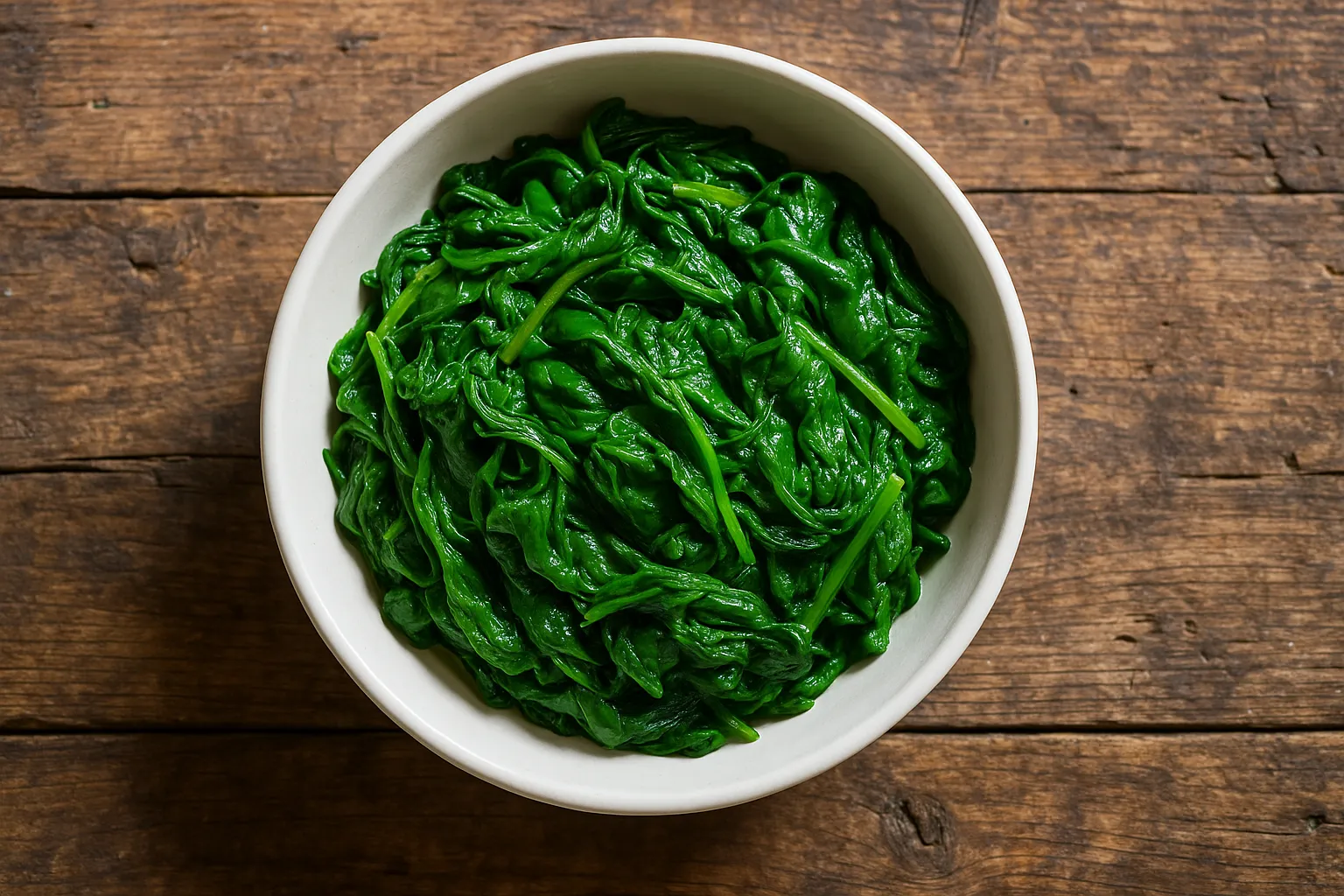Cooked Spinach: Calories, Nutrition and Health Benefits
Nutrient-dense leafy green powerhouse with iron, calcium, and vitamins - a superfood for every health goal.
Quick Nutrition Facts
Per 100g Serving (1/2 cup cooked)
| Nutrient | Amount |
|---|---|
| Calories | 23 kcal |
| Protein | 2.9g |
| Carbohydrates | 3.8g |
| Fiber | 2.4g |
| Sugars | 0.4g |
| Fat | 0.3g |
| Iron | 3.6mg |
| Vitamin K | 493mcg |
| Vitamin A | 9377 IU |
| Folate | 146mcg |
| Calcium | 136mg |
| Magnesium | 87mg |
Macronutrient Breakdown

NUTRITIONIST INSIGHT
Cooked spinach provides 5x more concentrated nutrients than raw due to volume reduction. Pairing with vitamin C-rich foods increases iron absorption by up to 300%. Add lemon juice or tomatoes for maximum benefits.
Myth Busters
MYTH #1: Spinach Isn't a Good Iron Source
TRUTH: Cooked spinach provides 3.6mg iron per 100g (20% DV). While it's non-heme iron with lower absorption than meat, pairing with vitamin C-rich foods increases absorption by 300%. Still beneficial for iron intake, especially for vegetarians.
MYTH #2: You Shouldn't Eat Spinach Because of Oxalates
TRUTH: While spinach contains oxalates, cooking reduces them by 30-40%. For most people, the nutritional benefits far outweigh concerns. Only those with kidney stones or calcium oxalate issues need to moderate intake. Drinking water helps flush oxalates.
MYTH #3: Cooked Spinach Loses All Its Nutrients
TRUTH: Cooking actually increases bioavailability of iron, calcium, and magnesium by breaking down cell walls. While vitamin C decreases by 50-60%, other nutrients become more absorbable. Light steaming preserves nutrients better than boiling.
MYTH #4: Spinach Gives You Instant Strength (Popeye Effect)
TRUTH: Spinach doesn't provide instant strength, but its nutrients support long-term health. The iron, protein, and nitrates can improve exercise performance and muscle function over time when consumed regularly as part of a balanced diet.
MYTH #5: You Need to Eat Huge Amounts for Benefits
TRUTH: Just 100g (1/2 cup cooked) provides 411% DV vitamin K, 187% DV vitamin A, 37% DV folate, and 20% DV iron. Small, regular servings (100-150g daily) offer substantial health benefits without needing excessive quantities.
MYTH #6: Spinach Causes Calcium Deficiency
TRUTH: While oxalates can bind some calcium, cooked spinach still provides 136mg calcium per 100g. The calcium in spinach has lower bioavailability, but consuming dairy or calcium-rich foods separately ensures adequate calcium intake.
NutriScore by Health Goals
| Health Goal | NutriScore | Why This Score? |
|---|---|---|
| Weight Loss |  | Only 23 calories per 100g with 2.4g fiber. Extremely filling, nutrient-dense, can eat large portions guilt-free. |
| Muscle Gain |  | 2.9g protein per 100g, iron for oxygen transport, nitrates improve blood flow to muscles during exercise. |
| Diabetes Management |  | Very low GI (15), minimal carbs (3.8g), high fiber. Magnesium improves insulin sensitivity. Perfect for blood sugar. |
| PCOS Management |  | Low-carb, anti-inflammatory, high in folate. Supports hormone balance and insulin sensitivity. |
| Pregnancy Nutrition |  | Rich in folate (146mcg for neural tube development), iron prevents anemia, calcium for fetal bones. |
| Viral/Flu Recovery |  | High vitamin A (187% DV) for immune function, easy to digest, anti-inflammatory properties support healing. |
PERSONALIZED NUTRITION
Track your meals with NutriScan for personalized NutriScores based on your specific health goals!
Blood Sugar Response to Cooked Spinach
Cooked spinach has virtually no impact on blood glucose due to its very low glycemic index and minimal carbohydrate content.
Typical Glucose Response Curve
*This chart shows typical blood glucose response for general healthy individuals. Individual responses may vary. Not medical advice.*
Why Spinach Is Blood Sugar Friendly
Cooked spinach has minimal effect on blood sugar due to:
- Very Low GI (15) - One of the lowest among all vegetables
- Minimal carbs (3.8g) - Mostly fiber with negligible impact
- High fiber (2.4g) - Slows digestion and glucose absorption
- Magnesium (87mg) - Improves insulin sensitivity
Perfect pairings for balanced meals:
- 🍚 With rice or roti - Adds fiber and nutrients without spiking blood sugar
- 🥘 In dal - Palak dal combines protein, fiber, and iron
- 🧀 With paneer - Adds protein and healthy fat for sustained energy
- 🍛 In curries - Palak paneer or palak chicken for complete nutrition
Cultural Significance
Spinach (palak) has been cultivated for over 2,000 years, originating in ancient Persia and spreading globally.
In India:
- Palak Paneer - Iconic North Indian dish, restaurant favorite worldwide
- Palak Dal - Protein-rich combination in homes across India
- Saag - Punjabi winter specialty with mustard greens and spinach
- Ayurveda - Used for blood purification, eye health, and digestion
- Regional Names: Palak (Hindi), Pasalai Keerai (Tamil), Palakura (Telugu)
Global Significance:
- Ancient Greeks and Romans grew spinach for medicinal purposes
- Chinese cuisine uses spinach in stir-fries and soups
- Mediterranean diet staple in spanakopita and salads
- NASA grows spinach on International Space Station for astronaut nutrition
Popeye Impact:
- 1930s cartoon character boosted U.S. spinach consumption by 33%
- Made spinach the third most popular children's food
- Based on misplaced decimal point (actually has 3.6mg iron, not 36mg)
Compare & Substitute
Cooked Spinach vs Other Leafy Greens (Per 100g)
| Nutrient | 🥬 Cooked Spinach | 🥬 Kale (cooked) | 🥬 Methi (Fenugreek) | 🥒 Cucumber |
|---|---|---|---|---|
| Calories | 23 kcal | 28 kcal | 49 kcal | 15 kcal |
| Carbs | 3.8g | 5.6g | 6g | 3.6g |
| Fiber | 2.4g | 2g | 3g | 0.5g |
| Protein | 2.9g | 1.9g | 4.4g | 0.7g |
| Iron | 3.6mg | 1.1mg | 1.2mg | 0.3mg |
| Vitamin K | 493mcg | 817mcg | 228mcg | 16.4mcg |
| Vitamin A | 9377 IU | 8900 IU | 2870 IU | 105 IU |
| Calcium | 136mg | 135mg | 75mg | 16mg |
| Folate | 146mcg | 19mcg | 57mcg | 7mcg |
| Best For | Iron, folate | Vitamin K, calcium | Protein, fiber | Hydration, low-cal |
Frequently Asked Questions
Is cooked spinach good for weight loss?
Yes, cooked spinach is one of the best foods for weight loss. At just 23 calories per 100g with 2.4g fiber, it's extremely nutrient-dense and filling.
Weight loss benefits:
- High volume, low calories - can eat large portions (150-200g)
- 2.4g fiber promotes satiety and reduces hunger
- High water content (91%) aids hydration and fullness
- Virtually no fat (0.3g) or sugar (0.4g)
- Rich in nutrients prevents deficiencies during calorie restriction
Best practices: Add to every meal, use in smoothies, pair with lean protein, season with minimal oil for maximum results.
How much iron is in cooked spinach?
Cooked spinach contains 3.6mg of iron per 100g (20% Daily Value). This is non-heme iron from plants, which has lower absorption (5-12%) compared to heme iron from meat (15-35%).
Maximizing iron absorption:
- Add vitamin C: Lemon juice, tomatoes, bell peppers (increases absorption 300%)
- Avoid tea/coffee: Tannins reduce absorption; wait 1-2 hours
- Cook properly: Steaming or sautéing preserves more iron than boiling
- Combine with meat: If non-vegetarian, pairing enhances absorption
For anemia or iron deficiency, consult a doctor - supplementation may be needed alongside dietary iron.
Can diabetics eat cooked spinach?
Absolutely - cooked spinach is excellent for diabetics. With a glycemic index of 15 (very low), 3.8g carbs, and 2.4g fiber per 100g, it has minimal blood sugar impact.
Diabetes benefits:
- Virtually no effect on blood glucose levels
- 87mg magnesium per 100g improves insulin sensitivity
- High fiber slows sugar absorption from other foods
- Rich in antioxidants reduces inflammation
- Can be eaten freely without portion restrictions
Best preparations: Palak dal (with protein), palak paneer, or sautéed with garlic. Eat 100-200g daily for optimal benefits.
Is cooked spinach high in vitamin K?
Yes, cooked spinach is one of the richest sources of vitamin K, providing 493mcg per 100g - that's 411% of the Daily Value in just half a cup.
Vitamin K benefits:
- Bone Health: Essential for calcium regulation and bone density
- Blood Clotting: Necessary for proper wound healing
- Heart Health: Prevents calcium buildup in arteries
IMPORTANT FOR BLOOD THINNER USERS
If taking warfarin (Coumadin) or other blood thinners, maintain consistent vitamin K intake. Don't avoid spinach, but eat similar amounts daily. Consult your doctor before changing spinach consumption.
Should I eat spinach raw or cooked?
Both forms have unique benefits - ideally, eat both for diverse nutrition.
Cooked Spinach Benefits:
- 5x more concentrated nutrients due to volume reduction
- Better absorption of iron, calcium, and magnesium
- Lower oxalates (30-40% reduction) - better for kidney health
- Easier digestion for those with sensitive stomachs
Raw Spinach Benefits:
- Higher vitamin C (not destroyed by cooking)
- More folate (heat-sensitive, reduced 30% when cooked)
- Enzymes intact for digestion
- Crunchy texture for salads
Best approach: Raw in salads 2-3 times/week, cooked in curries 4-5 times/week for balanced nutrition.
Is cooked spinach good for pregnancy?
Yes, cooked spinach is excellent for pregnancy. It's a powerhouse of nutrients essential for fetal development and maternal health.
Pregnancy benefits:
- 146mcg folate (37% DV): Prevents neural tube defects in first trimester
- 3.6mg iron (20% DV): Prevents pregnancy anemia, supports increased blood volume
- 136mg calcium: Supports fetal bone development
- 9377 IU vitamin A: Essential for fetal eye and organ development
- 2.4g fiber: Relieves pregnancy constipation
Safe preparation: Cook thoroughly to reduce oxalates and eliminate any bacteria. Eat 100-150g daily, paired with vitamin C for iron absorption.
How should I cook spinach to retain nutrients?
Best Cooking Methods (Nutrient Retention):
- Steaming (5-7 minutes): Retains 90% of nutrients, reduces oxalates
- Sautéing (3-5 minutes): Quick cooking with minimal oil preserves vitamins
- Stir-frying (2-3 minutes): High heat, short time retains nutrients
- Microwave (2-3 minutes with water): Minimal nutrient loss
Avoid: Boiling for long periods (leaches nutrients into water)
Pro tips: Use minimal water, cook briefly, add lemon/tomato for iron absorption, save cooking water for dal or soups to retain nutrients.
Can I eat cooked spinach every day?
Yes, eating cooked spinach daily (100-200g) is safe and beneficial for most people. Regular consumption provides consistent nutrients for optimal health.
Daily amount recommendations:
- 100g (1/2 cup): Minimum for health benefits
- 150g (3/4 cup): Optimal for most people
- 200g (1 cup): Safe maximum for daily intake
Cautions:
- Kidney stones: If prone to calcium oxalate stones, limit to 100g and drink plenty of water
- Blood thinners: Maintain consistent daily amounts, inform your doctor
- Thyroid issues: Cooked spinach is safe (goitrogens reduced by cooking)
Track your intake with NutriScan app to maintain balanced nutrition across all food groups.
 ChatGPT
ChatGPT  Claude
Claude  AI Mode
AI Mode  Perplexity
Perplexity 



